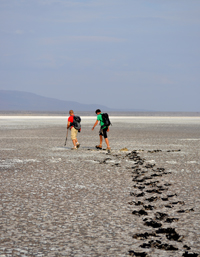The School for Field Studies recently presented its biannual Distinguished Student Researcher Award to University of St. Thomas junior Luke Nolby, a biological sciences major. Nolby received the award in recognition of the exceptional environmental research he conducted while studying abroad during fall semester 2011 at the SFS Center for Wildlife Management Studies in East Africa.
Each year, the School for Field Studies honors exceptional students with Distinguished Student Researcher Awards for making important contributions in environmental research. SFS semester students engage in undergraduate research guided by SFS faculty on projects related to the center's five-year research plan. Outcomes of these directed research projects provide information and recommendations to community members and other stakeholders on critical, local environmental issues.

Luke Nolby and another student walk across the salt-encrusted mud of Lake Manyara's drying lakebed, Lake Manyara National Park, Tanzania.
Students are nominated by SFS faculty based on their demonstrated sophistication in research design, field work, and reporting; their leadership skills and teamwork; and their contribution to the center's five-year plan. The SFS award also recognizes the students’ leadership exhibited while working with a team of student and faculty researchers in the field.
“Luke’s research results will be useful to the stakeholders in wildlife conservation in the Amboseli ecosystem, especially to managers of wildlife sanctuaries,” remarked Dr. Shem Mwasi, adviser to the project.
Nolby’s research project, “Relating Diversity to Spatial, Habitat, and Focal Species Characteristics in Six Wildlife Sanctuaries, Amboseli Ecosystem,” assessed the wildlife species richness, abundance and evenness of six sanctuaries in the Amboseli ecosystem, which are important dispersal areas for wildlife in Amboseli National Park. The research team found that habitat type and the presence of elephants are better predictors of wildlife diversity in these areas rather than the shape of the protected area. Past management programs have focused more often on spatial aspects, so support for the greater influence of biotic characteristics on diversity is important for leading to more effective conservation in the future.
“I’ve never felt so connected before, so in the moment and aware, than when I was in Africa; staring a hyena in the eye in the darkness of the Serengeti or slowly backing away from a grumbling elephant can do that to you,” Nolby said of his East African experience. “I’ve also never met kinder, more relaxed, or happier people, people who have so much less – materialistically – than we do. 'Hakuna matata' actually translates from Swahili as ‘there are no problems.’ For us, it doesn’t go much beyond a lion, a meerkat and a warthog singing, but in East Africa, it’s a way of living that I hope to embrace a little more each day.”
East Africa experience photo gallery, Luke Nolby
[nggallery id=14]
School for Field Studies
For more than 30 years, The School for Field Studies, the nation's largest environmental study-abroad program for college undergraduates, has combined hands-on, multidisciplinary environmental studies with scientific research to propose sustainable solutions to critical environmental problems. SFS students work with local communities to discover practical ways to manage their natural resources, and in the process undergo a transformational experience that helps them to advance their careers as skilled professionals and to become globally aware citizens.






